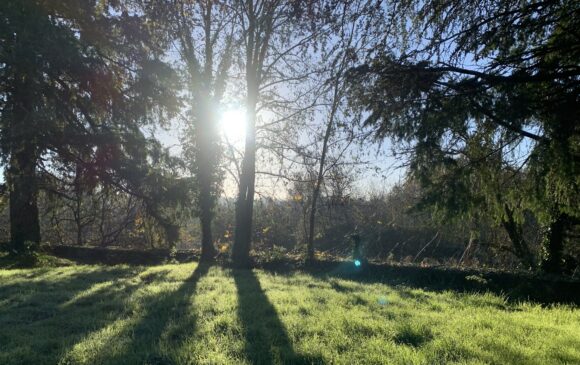
In interactions with young people especially, the subject of ecoanxiety is often lurking. How we deal psychologically with the environmental reality of the world is a subject we certainly need to acknowledge and that we need to figure out how to better address. I have developed my own set of views, which I may lay out one day, but this week, at Godrej’s “Conscious Collective” event Mumbai, I heard a very compelling take on the subject from the extremely charismatic Bittu Sahgal that I’d like to share.
Bittu Sahgal, at right in stage in the photo above, is a major figure in the Indian environmental movement. He created the magazine Sanctuary Asia in 1984 and founded the NGO Sanctuary Nature Foundation. He has also produced many documentaries and books and represents environmental causes in numerous committees and fora. Most of all, he is a man of infectious enthusiasm, with a gift for formulations that truly hit the mark.
With his characteristic verve and a mischievous smile, Sahgal straightaway corrects the first misconception of the standard ecological narrative: none of this is about saving the planet. “Don’t worry about Mother Earth,” he says. “She knows how to take care of herself.” Like our own bodies, the planet is remarkably resilient, it knows how to heal itself. It will be around long after we are not.
The whole subject is not about morality and culpability. “Nature does not judge,” he says. It does not care who is responsible for this or that form of environmental damage. It only gives us warnings. And then it gives us consequences. It is up to us to hear those warnings and adapt. If we don’t do so, we will find ourselves before the consequences. The biosphere is king.

In the environmental sphere, Sahgal sees a recurrent issue with miscast questions that lead to basically erroneous ways of thinking about things. He reminds us that if we ask the wrong question, we will not reach the right answer. This is wisdom we would all do well to take away and apply by always thinking hard about whether we are even asking the correct question, before getting to deliberations about the answer.
For example, we constantly hear about the cost of climate change. But Sahgal sees the question itself as inducing backward thinking. “The question is not how much we need to spend to repair the world, but how much we should not spend to not destroy it.” Cast in that way, we would arrive at a very different set of answers.
What is happening at what Sahgal calls “COP Out 28” is the very image of what he calls irresponsable optimism. It is a great collective shirking of responsibility with a thin veneer of unfounded optimism.
What is better, he feels, and that we can each adopt, is hopeful pessimism. We should see things with lucidity, in the cold light of day, while maintaining a positive mindset. The slogan we should have etched in our minds is: “Plan for the worst, hope for the best, and accept what comes.”
So what should we do? Sahgal definitely exhorts us to act, and do so firmly and tenaciously, but respectfully. The complexity and importance of the matter does not allow for division and conflict. We need to avoid characterization bias, where there is a “they” and “they” do not know. Especially in inter-generational interactions, young people need to mobilize friendly, naive insistence toward elders. It is not about invoking morality, but always reminding people that every act against the environment has consequences against others, and often against oneself.

None of this should be an ordeal. You should get involved doing what makes you happy and what you are good at. There are many ways to contribute, and you should choose one that makes you feel good.
Even more important is to not overreach. Don’t carry the full weight of the problem on your shoulders. Each contribution will be small. Only collectively can the outcome can be large.
The final bit of advice seems to me to be hardwired into Bittu Sahgal’s mindset. Through it all, we need to remain grounded in our humanity, as much to win over others as for our own well-being. Everything we do, he says, we should do with a smile.